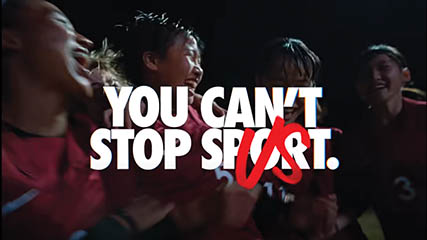Soccer Struggles in the Fight Against Racism
By Danial Golforoush
As I was contemplating which topic to pursue in my next article on soccer, it became apparent that racism within soccer was the timeliest topic. Not only because May 25th was the first anniversary of George Floyd’s murder, but because it felt like we are not moving into a better future—especially in soccer. On May 26th, I was just looking to spend a quiet day as my team, Manchester United, suffered an unexpected loss against Villarreal, a team with a tenth of our resources. However, hearing that Marcus Rashford and other players of color were being racially abused online made the loss in the Europa League final feel irrelevant.

The world of soccer is no stranger to racial abuse and discrimination on and off the pitch, but the increased popularity of various social media platforms has given more direct access to individuals of color within the game. While this issue is not anything new, it has received a lot more exposure since Raheem Sterling’s viral post in 2019; the Manchester City forward/English international star’s post compared the coverage that black and white teenage players receive from the media. The differences were shocking. Since then, major soccer broadcasting channels and podcasts have routinely dedicated special segments, additional discussions, and special programming to racism and its effect on football and vice versa (although it’s arguable how effective those programs really are). The Premier League and other leagues and federations have also attempted to fight racism on and off the pitch for many years now.
As players, teams, leagues, and federations continue to struggle to introduce a new concrete, preventative, and constructive plan to tackle racism in football for good, multiple different methods have been proposed—each with its own strengths and weaknesses. The latest method has been to raise awareness and demonstrate support by kneeling before the kick-off of each game in the Premier League; however, in the past few months, some activists and players of color have spoken against this practice as they believe it has become part of the “routine” and lost its meaning. Famously, Queens Park Rangers was the first team to stop taking a knee in England as the club saw kneeling as a pure PR move from the league. In addition, Wilfred Zaha of Crystal Palace F.C. announced that he would no longer be taking the knee. In mid-February, Zaha discussed his decision during an episode of the On The Judy podcast, saying “The whole kneeling down—why must I kneel down for you to show that we matter? Why must I even wear Black Lives Matter on the back of my top to show you that we matter? This is all degrading stuff.” He continued by mentioning that these actions have a more “tick the box” quality rather than a constructive reason behind them.
This issue has become a point of contention recently as more teams, football associations (FAs), and leagues have been accused of using racial justice as a PR and marketing campaign. Recently, Patrick Bamford shed light on the way that the leagues and FIFA handled the proposal of the biggest teams of Europe creating their own separate league versus the handling of racism in the game. In an interview after their match against Liverpool F.C., the British striker of Leeds United said “It’s amazing the amount of uproar that comes into the game when somebody’s pockets are being hurt. It’s a shame it’s not like that when all the things that go wrong with things at the minute, racism and stuff like that.” He was referencing the announcement of a new “Super League” by twelve of the top European soccer teams; in a matter of days, FIFA took a strong stance against such plans with heavy and unprecedented economic sanctions and the threat of exclusion from international tournaments. On the other hand, players have been facing online, on-field, and off-field racial abuse since soccer was only a local sport in England—and the problem is nowhere close to being solved.
The abuse sometimes has been so apparent and direct that some players and teams have walked off the pitch. Harry Kane, captain of the English National Team, has famously said that he would walk the English team off the pitch if players faced more racism. Kane’s teammate, Raheem Sterling, has contested this idea and has alternatively advocated for point deduction. Sterling believes that by walking off the pitch, the team is allowing the racists to win. “To win the game would hurt them even more,” he said. “They’re only trying to get you down.”
Sports fans’ actions are often written off as banter and harmless talk, but it is important to remember that these “fans” are members of our communities who could and do have a bigger impact on our society than we may realize. In response to the racial abuse received through social media after the loss on May 26th, Marcus Rashford tweeted: “At least 70 racial slurs on my social accounts counted so far. For those working to make me feel any worse than I already do, good luck trying.” However, more importantly, he followed up this tweet with another: “I’m more outraged that one of the abusers that left a mountain of monkey emojis in my DM is a maths teacher with an open profile. He teaches children!! And knows that he can freely racially abuse without consequence… .”
While there is discussion around various methods of confronting racist behavior in soccer, none of them recognizes racism as an issue deeply rooted in our society, instead treating racism as an isolated, self-contained phenomenon in football. Most of the campaigns and solutions surround the act of racism within the match and the federation or club’s diplomatic reaction to it. Any long-lasting solution then must necessarily come from within—fan-led and grassroots-initiated programs alongside education and equity programs.
Each FA must appoint a board of experts and critics of not only football, but race, ethnicity, gender, and sexuality, to be able to tackle this systematic issue in a prepared and planned manner with qualified individuals. Anti-discrimination programs, such as mandatory workshops and classes for grassroots and youth teams, will establish and begin such discussion within the younger football players and consequently help to create a more inclusive space for all. Football possesses an extraordinary international reach which surpasses cultural, linguistic, and physical borders and boundaries, and federations and football associations must take advantage of such a platform to create long-lasting positive systematic change.


















